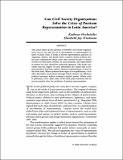| dc.description.abstract |
This article takes up the question of whether civil society organizations (CSOs) can and do act as mechanisms of representation in times of party crisis. It looks at recent representation practices in Argentina, Bolivia, and Brazil, three countries where political parties have experienced sharp crises after several decades of mixed reviews for their party systems. At such moments, any replacement of parties by CSOs should be especially apparent. This study concludes that the degree of crisis determines the extent that CSOs’ representative functions replace partisan representation, at least in the short term. Where systems show signs of re-equilibration, CSOs offer alternative mechanisms through which citizens can influence political outcomes without seeking to replace parties. Where crisis is profound, CSOs claim some of the basic party functions but do not necessarily solve the problems of partisan representation. |

